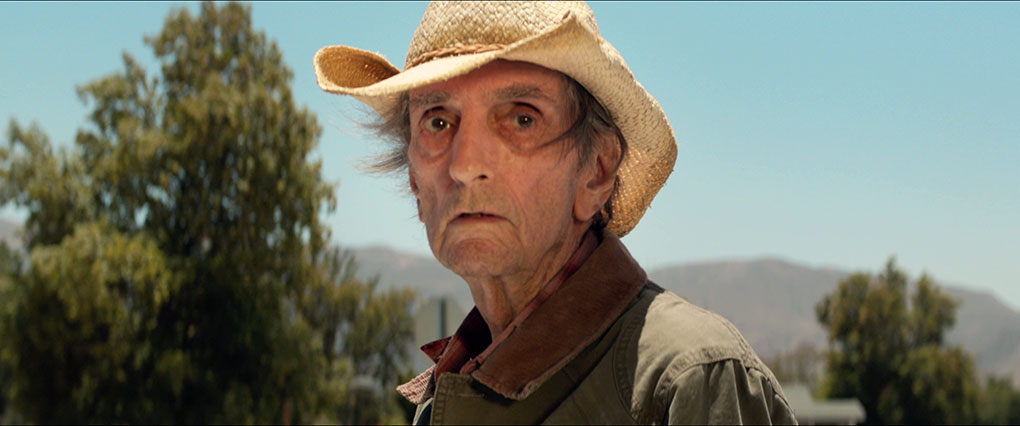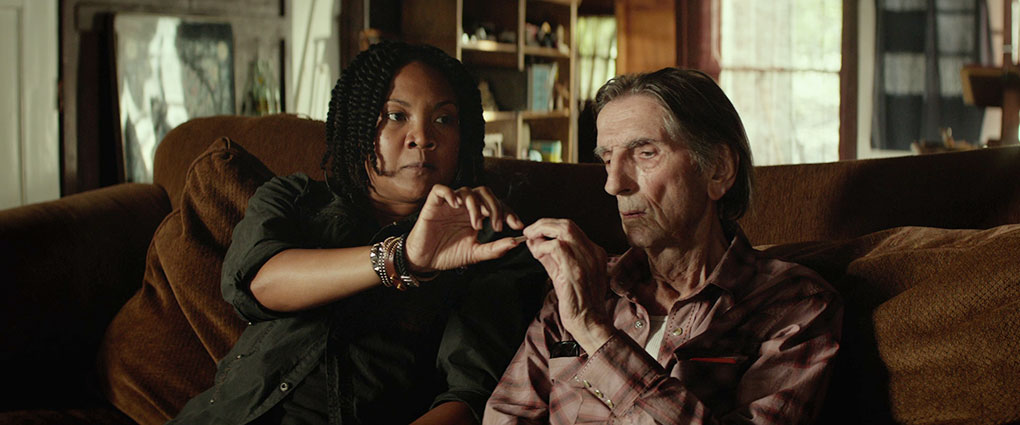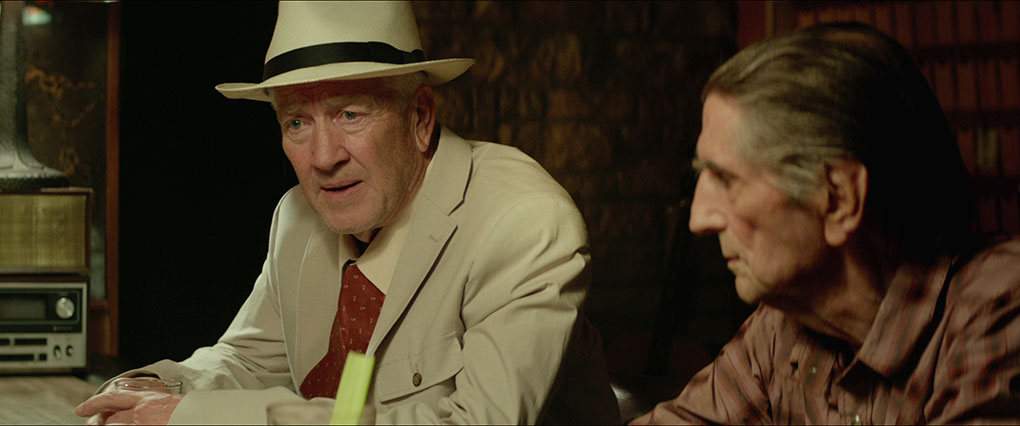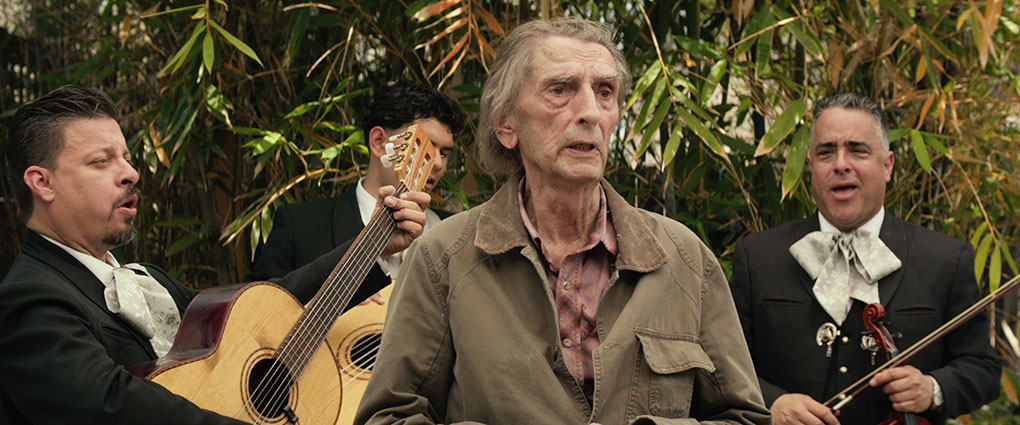| |
"If you're the kind of person that doesn't like Harry Dean Stanton then you have a character flaw, there's something wrong with you." |
| |
Screenwriter and Stanton's friend and assistant, Logan Sparks |
I can't recall with any clarity when I first started to really notice and appreciate the work of Harry Dean Stanton, a hugely talented character actor with a captivating screen presence whose wonderfully weather-beaten face makes me suspect that even in his late teens he looked like a man in his 40s. I'm fairly sure there was no single revelatory performance that clued me into him, but suspect that it was a gradual process of recognition and osmosis. I still have strong memories of my first viewing of Wim Wenders' Paris, Texas, one of only two films I've seen in which he plays the lead role, but Stanton didn't figure that highly in that recollection for reasons I've already been into in my DVD review of that film. I should point out that I now regard his performance as the withdrawn and initially mute Travis Henderson as one of the finest of his esteemed career.
I still delight in spotting the younger Stanton in small roles in movies or TV shows, particularly when revisiting films that I saw as a younger man and I didn't realise he was in. Films in which he did make a specific impression on me the first time around include John Milius's Dillinger, Monte Hellman's Cockfighter, Dick Richards' Farewell, My Lovely, Arthur Penn's The Missouri Breaks and Ulu Grosbard's Straight Time, all excellent movies from a decade in which American cinema seemed to be bristling with them. Then in 1979, two specific films put him so firmly on my radar that I began hunting out anything else in which he had appeared. The first of these was a certain space-bound horror movie known as Alien, in which he played the quieter half of the ship's technical crew, one whose favourite line of minimalist dialogue was "Right" and whose death had the most terrifying build-up of any in the film. The second was John Huston's extraordinary Wise Blood, in which he played blind preacher Asa Hawks in a film that featured another talented character actor in the lead in the shape of the oft-undervalued Brad Dourif. Stanton appeared in two films for John Carpenter, playing Brain in Escape From New York and the peskily persistent Detective Rudolph Junkins in Christine, and was so memorable as the hopelessly doomed Johnnie Farragut in David Lynch's Wild at Heart that he went on to work with again Lynch on several occasions, delivering a memorable cameo at the climax of The Straight Story and reviving his role from Twin Peaks: Fire Walk with Me in the mind-bending 2017 revival of the series. And who could forget his blistering turn as the coke-snorting hard-ass Bud in Alex's Cox's Repo Man? This, I should point out, is just a small selection from the 200+ film and TV roles he played in his 63-year career.

Lucky is only the second film I've seen in which Stanton plays the lead, and the only one in which he plays the title character. There's no real story in the traditional sense, just a character to engage with and observe over the course of a few days as he goes about his day and interacts with others in the small desert town in which he lives. The man in question is 91-year-old Lucky, whose daily routine includes a morning yoga session, a walk to a coffee shop to do a crossword, watching game shows on TV, grabbing a couple of drinks in the evening at the local bar, and barking an obscenity into a yellow tunnel for reasons that are not revealed until late into the film. He lives alone, has never married, has no children that he is aware of, and has an undisguised contempt for religion and the concept of the soul. His tends to hide any liking for others behind his irascible nature, greeting coffee-shop owner Joe each morning by telling him, "You're nothing!" a proclamation that is promptly returned in kind. His closest friend is Howard, a fellow bachelor who we first meet in a state of extreme agitation because his long-term companion – a tortoise named President Roosevelt – has run away.
I'm aware that Lucky is being described elsewhere as one of Stanton's last films rather than the last one, a technically accurate description given that Michael Oblowitz's Frank and Ava was still in production when Lucky first hit US cinemas and has yet to land a fully-fledged release of its own. Yet no final film I can recall by any actor feels more like a cheery and knowing goodbye to the audience than this one. If you've seen it, you'll know why, and if not then it's probably unfair fair of me to start justifying this claim with specifics. I've watched it twice now. At the end of the first viewing I had the widest of smiles on my face – a response that Lucky himself encourages – and on the second I had a small tear in my eye. But the smile was still there.
My stronger emotional response on that second viewing was down in no small part to the discovery that Lucky is modelled closely on Stanton himself. Specific exchanges have clearly been inspired by actual conversations that he had with others, a couple of which were even caught on camera and included in the accompanying documentary, Harry Dean Stanton: Partly Fiction. Stanton was almost the exact same age as Lucky, had never married or had children, and at the time of filming lived alone in a house peppered with interesting memorabilia and photos from his past that seem to have stories of their own to tell. This is perhaps unsurprising when you consider that the film was co-written specifically for Stanton by actor Drago Sumonja and Logan Sparks, the latter of whom was for many years Stanton's close friend and assistant, and who probably knew him as well as anybody. None of which would matter a hoot if the resulting film didn't hold the interest, but despite the fact that there's little in the way of action only the faintest trace of the traditional equilibrium-disruption-resolution narrative structure, there genuinely isn't a dull or mistimed moment here. For all his grouchiness, Lucky himself is a delight to watch, the sort of cantankerous old man you'd actually want to hang out with and hope desperately for a nod of approval from, aware that this goal would likely take some years to achieve.

As the film progresses, small signs of Lucky's regrets and a growing awareness that his days on earth are numbered start to show, a gradual awakening on his part that is most evident in two of the film's most quietly captivating scenes. The first comes when Lucky shares a joint with local waitress Loretta after she drops by his house to check he is OK after a fall, and as she gets up to leave a moment passes between them that suggests they have an unspoken fondness for each other that transcends the considerable difference in their ages and backgrounds, which is immediately followed by a telling confession from Lucky that prompts an understanding response from Loretta. The second occurs when Lucky is invited by local Mexican shopkeeper Bibi to her nephew's birthday fiesta, at which he watches the singing of a birthday song by the boy's large family with a look that speaks volumes about his own past life choices. He then finds an unexpected way to become part of a group in which he is an awkward outsider by singing a Mexican song, an impromptu but heartfelt performance in which is he soon joined by the fiesta's Mariachi band and Bibi's delighted family. His sometimes inconsistent approach to friendship, meanwhile, is neatly captured in a single sequence when he sees Howard talking to his attorney Bobby Lawrence about an end-of-life plan. So contemptuous is he of Lawrence's profession and so convinced that the man is trying to fleece his friend that he challenges him to a fight, yet his bond of friendship with Howard doesn't stretch to understanding that repeatedly identifying his tortoise as a turtle infuriates him and prompts him to explode and deliver a passionate speech about his absent reptile that could easily be about Lucky himself.
There's a lovely irony in the fact that what will probably (and should) be remembered as the final film of one of American's most beloved character actors was written and directed by first-timers. Despite having worked in the film industry for some years, neither Logan Sparks nor Drago Sumonja had written a screenplay before, and making his first outing in the director's chair is John Carroll Lynch, another fine character actor whose many and memorable screen roles include Marge Gunderson's husband Norm in the Coen brothers' Fargo and the man who might well be the serial killer of the title in David Fincher's Zodiac. It's clear that all three had a unified vision of how the film should look and play (this is confirmed in the extra features), and as a result Lynch's unobtrusive direction matches every carefully timed beat of the screenplay perfectly.
In order to sell the project to Stanton – who was by then approaching 90 himself and all but retired from acting – key roles were offered to actors who were also his friends, which results in a cast that adds to the film's future cult potential. All are integral to the progress of Lucky's gradual enlightenment but all also have moments in which they are able to quietly shine. Everyone who has more than a single line of dialogue deserves a mention here, but I'll give a special shout to Beth Grant as a sassy bar owner Elaine, James Darren as her philosophical other half Paulie, Yvonne Huff as protective café waitress Yvonne, Hugo Armstrong as laid-back barman Vincent and Ron Livingston as well-meaning attorney Bobby Roberts. Best of all are Ed Begley Jr. as Lucky's pragmatic and splendidly named doctor, Christian Kneedler, Tom Skerritt as a WW2 veteran (he's a tad too young for the role but we'll let that slide) with whom Lucky reminisces in a scene with strong echoes of a similar one from David Lynch's The Straight Story, and David Lynch himself, who is at his front-of-camera best here as Lucky's best friend, Howard.

Although light on incident and boasting no startling surprises, there is so much here in the character detail and performances and the underlying themes of humanity, mortality and friendship that my second viewing proved to be every bit as rich and rewarding as the first, and a third and even fourth would have quickly followed had life and other movies not got in the way. Stanton's wonderfully nuanced performance is enough to pull you back for multiple viewings, but that's just one of many reasons to visit and revisit this disarmingly captivating film. If only every great actor could give the world such a warm, revealing and touching parting gift. We should be so lucky.
In one his interview on this disc, co-screenwriter Drago Sumonja makes a point of stating how determined they were to shoot Lucky on film, and only reveals in a throwaway comment that the cost would have been prohibitive for such a low-budget feature. In the end the film was shot digitally, research suggesting on an Arri Alexa camera but with older Panavision anamorphic lenses. The result is a handsome-looking film that has received a pristine 2.40:1 1080p transfer on Eureka's Blu-ray, one that lacks our beloved film grain but which boasts pin-sharp detail, perfectly pitched contrast and naturalistically rendered colour, with the brighter primes singing when they are called on to do so.
There are two soundtrack options, Linear PCM 2.0 stereo and DTS-HD Master Audio 5.1 surround, and both serve the film well, being clear, well mixed and with an excellent dynamic range. This is not a film to show off your sound system, but there is a brief dream sequence in which the soundtrack is dominated by pounding dance track, one that really benefits from the extra bass boost that the DTS track delivers.
Subtitles for the deaf and hearing impaired have been included.
Harry Dean Stanton: Partly Fiction (76:27)
An impressionistic, feature-length portrait of Harry Dean Stanton by Sophie Huber that refuses from the off to play out as a regular film biography, with voices matched to imagery that may or may not be relevant to what is being said and just occasionally has the air of footage that was grabbed on the move. When Stanton does appear, he does so in monochrome to sing us a song, the first of many such musical interludes that respond to his regret that he did not pursue a musical career. Segments of a more revealing interview conducted on the back seat of a moving car intermittently put in an appearance, and as the film progresses, the experimentation settles down a little to include chats with friends and colleagues such as Kris Kristofferson, Deborah Harry, Sam Shepherd, David Lynch and even Lucky co-writer Logan Sparks in his role as Stanton's assistant, as well as footage of Stanton hanging out in his favourite bar, whose owner he has been friends with for 42 years. Unconventional the film may be, but there is a wealth of interesting material in here, including recollections from Stanton of the two years he lived with Jack Nicholson ("never boring"), the news that a woman he fell for ended up with Tom Cruise instead (ouch), and how he and Bob Dylan disrupted the filming of Pat Garrett and Billy the Kid by jogging through the background of a shot that then had to be re-filmed the following day. Watch Lucky first and you might be as surprised as I was to hear snippets of dialogue from the film delivered here as conversation, which adds to the biographical feel of the main feature.

John Carroll Lynch Interview (13:51)
Actor and director John Carroll Lynch reveals how he landed the job of helming his first movie, tells an amusing story about his first meeting with Stanton and outlines the process of getting him to commit to the film, and describes him as "one of the coolest people I've ever met." He confirms that the character of Lucky is in some ways who screenwriters Logan Sparks and Drago Sumonja think Stanton is, praises Tim Suhrstedt's cinematography, and reveals how important Stanton was as a focus point for his own approach to acting.
Logan Sparks & Drago Sumonja Interview (27:25)
Screenwriters Logan Sparks and Drago Sumonja – more the former than the latter – talk about the inception and development of the script, how spending time with Stanton would recharge them when they hit a block with his character, how John Carroll Lynch's direction took many of its cues directly from the screenplay, that the suggestion that they get David Lynch to play Howard came from Stanton himself, and a whole lot more. They also make it clear that had Stanton not agreed to do the film that it wouldn't have been made, but amused the hell out of me by suggesting that their backup plan was to wait 30 years and offer it to John Hawkes.
How refreshing it is to encounter a small-scale modern independent American movie with such heart and such an attention to character detail. Some will doubtless find it a pleasant but unexceptional experience, and to them I say give it another look and relish it how much Stanton, Carroll, Sparks and Sumonja and their collaborators say to us without shouting or sentimentality or the need to hammer points home. For the performances alone I'd be championing this movie, but there's so much more here, in the thoughtfully structured script, the subtle direction, the relatable themes and even the location. Eureka's Blu-ray release has done the film proud – the transfer is terrific, and while the special features may seem small in number, their quality and substance is high – one of them is a also feature-length movie with its own IMDb page. Now that's value. Highly recommended.
|